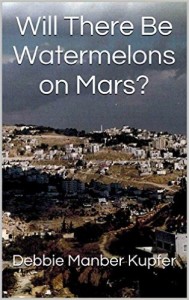 ‘Will There Be Watermelons on Mars?’ by Debbie Manber Kupfer told an interesting story. Having listened to it as an audiobook, I may not have gotten as much out of it as I would have by reading the written words on the pages of the collection of vignettes. This isn’t to say that the audiobook wasn’t intriguing; it’s just that this was my first foray into listening to an audiobook, and I found that it wasn’t quite as much my cup of tea as reading it myself. To each their own, however. I’m sure that audiobook lovers will find the recorded version just as enjoyable as I find the words on the page.
‘Will There Be Watermelons on Mars?’ by Debbie Manber Kupfer told an interesting story. Having listened to it as an audiobook, I may not have gotten as much out of it as I would have by reading the written words on the pages of the collection of vignettes. This isn’t to say that the audiobook wasn’t intriguing; it’s just that this was my first foray into listening to an audiobook, and I found that it wasn’t quite as much my cup of tea as reading it myself. To each their own, however. I’m sure that audiobook lovers will find the recorded version just as enjoyable as I find the words on the page.
The stories brought out my love of symbolism. Whether Manber Kupfer meant for symbolism to be injected or not, I cannot say, but it struck me after finishing the collection that the question of whether there will be watermelons on Mars is akin to the idea of impossibilities and pondering whether or not they have the likelihood of coming true. No one would have ever thought that watermelons could be present on Mars, or that travel to Mars would one day come to fruition. Yet, in Manber Kupfer’s stories, these ideas are given credence.
As someone who has followed the unrest in the Middle East with quite a bit of worry over what may come to pass if people continue to resist just getting along and finding ways to make peace, I found the last couple vignettes, especially, to be much more intriguing than the first couple. The idea of a Jewish man and an Arab woman falling in love and finding resistance to their relationship on all sides rang all too true, as even though this isn’t heard about much, it certainly must occur sometimes, even if not often. Despite the anger stemming from both sides of their relationship, they want to find a way to move forward with their love, and the way they want to do that is to move to Mars since the end of the world is supposedly near. Despite their living in Jerusalem, as all the characters throughout the vignettes do, they don’t even know if they are safe there from this potentially inevitable end, in the only place where anyone thinks God may save them, since it is the Holy Land, after all. Uncertain whether life still exists outside of Jerusalem, they find solace in the idea of moving to Mars, which is where the symbolism lies. They never thought they would be able to live a life of peace and happiness, free of the burden of people’s stares and judgment, but they find that it may just be possible with this attempt at a new life.
Debbie Manber Kupfer has woven a tale that rings true in this day and age of uncertainty and hope for possibility. I recommend checking it out.
You can find ‘Will There Be Watermelons on Mars?’ by Debbie Manber Kupfer here: http://amzn.to/1G8DgGs
